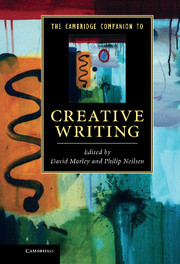Book contents
- Frontmatter
- 1 Introduction
- PART I GENRES AND TYPES
- 2 A writing lesson: the three flat tyres and the outer story
- 3 In conversation: a new approach to teaching long fiction
- 4 Genre and speculative fiction
- 5 Writing drama
- 6 Poetics and poetry
- 7 Travel writing
- 8 Creative writing and new media
- 9 Creative translation
- 10 Life writing
- PART II TOPICS
- Further reading
- Other titles in this series
- Index
5 - Writing drama
from PART I - GENRES AND TYPES
Published online by Cambridge University Press: 28 March 2012
- Frontmatter
- 1 Introduction
- PART I GENRES AND TYPES
- 2 A writing lesson: the three flat tyres and the outer story
- 3 In conversation: a new approach to teaching long fiction
- 4 Genre and speculative fiction
- 5 Writing drama
- 6 Poetics and poetry
- 7 Travel writing
- 8 Creative writing and new media
- 9 Creative translation
- 10 Life writing
- PART II TOPICS
- Further reading
- Other titles in this series
- Index
Summary
Writing drama appears in various guises on creative writing courses: as ‘screenwriting’, ‘scriptwriting’, ‘playwriting’, ‘writing for performance’. Often two or more of these categories are conflated: ‘writing for stage, film, radio and TV’, as if the media-specific skills were simply interchangeable.
This chapter is very deliberately entitled ‘Writing drama’, in order to mine a clear path through these attempts to pinpoint the third of the core genres of imaginative writing: prose fiction, poetry and drama. It's important to do that in order to understand what is involved in writing drama, in the distinctive ways it circulates from imagination to page to stage to page to imagination. These ways are radically different from prose fiction and poetry. I will argue also (contentiously for some, but argument is always a good thing) that, like prose fiction and poetry, writing drama is a discrete literary activity and process. This is notwithstanding the necessity of performance in relation to drama as a fictional genre.
Publication and pedagogy
Unlike the novel and poetry, where publication is on the page and in the book, writing drama reaches its audience through performance (live or recorded) before (if ever) attaining publication in print. Indeed, this is part of the excitement of writing drama – a passion for the power and magic of performance. Performance excites the drama-writing process, and ways of thinking about performance have expanded considerably in recent decades. However, these very expansions, while illuminating many aspects of performance, have also served to confuse and mystify the imaginative and material role of the dramatist.
- Type
- Chapter
- Information
- The Cambridge Companion to Creative Writing , pp. 52 - 66Publisher: Cambridge University PressPrint publication year: 2012

